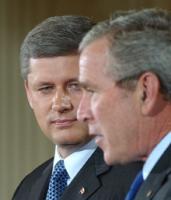The Canadian Council of Chief Executives has released a report calling for a national action plan enlisting government, business and individuals to cut greenhouse-gas emissions. While business has already done much to become more energy efficient, the document says, it must now do even more.
The group also acknowledged that market forces alone are unlikely to be sufficient, and that government intervention will be necessary.
That said, however, nowhere did the document call for mandatory limits on carbon emissions, rejected by both Canada and the Bush Administration. Not surprisingly, it supports Prime Minister Stephen Harper’s position that new technology can play a key role in reducing greenhouse gases.
After referring to the need of government intervention, the paper said emissions’ trading is “attractive in theory” and a fair and effective system can be worked out. While not proposing a new carbon tax, the CEOs said if government decides to go that route, it should replace other forms of taxation so it doesn’t turn into a “revenue grab.”
In the end, the report is in step with the Harper and Bush governments’ plan to fight global warming as long as it doesn’t restrict economic growth.
Subscribe to our newsletter
Stay up to date with DeSmog news and alerts






